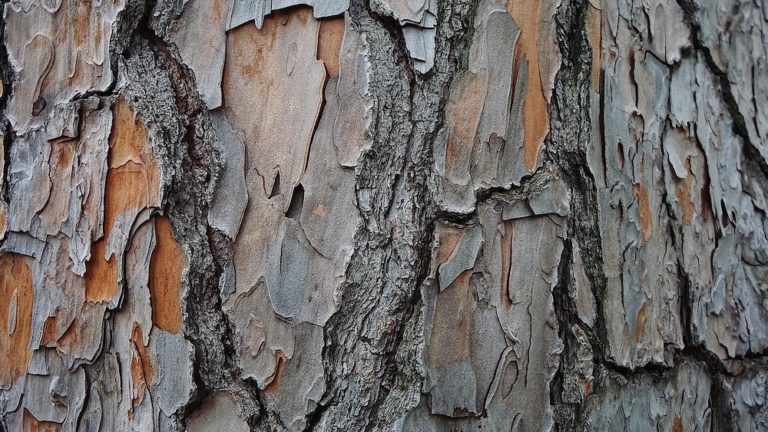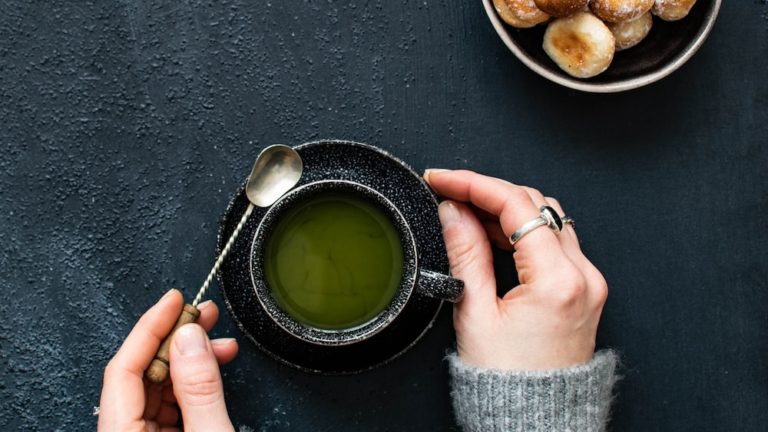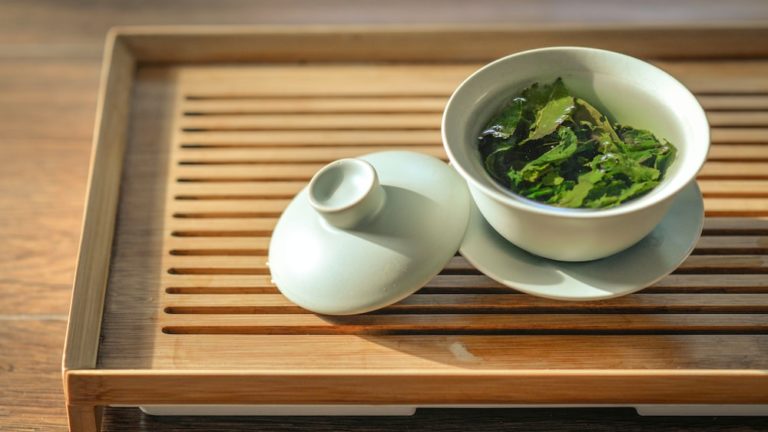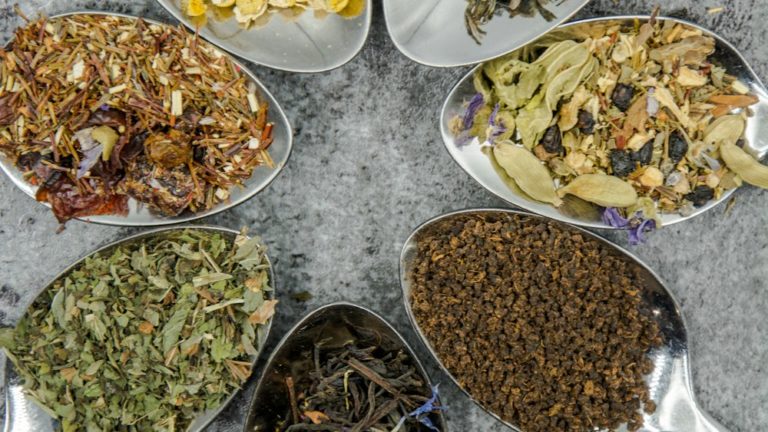11 Best Teas For Relieving Black Tea Headache Naturally
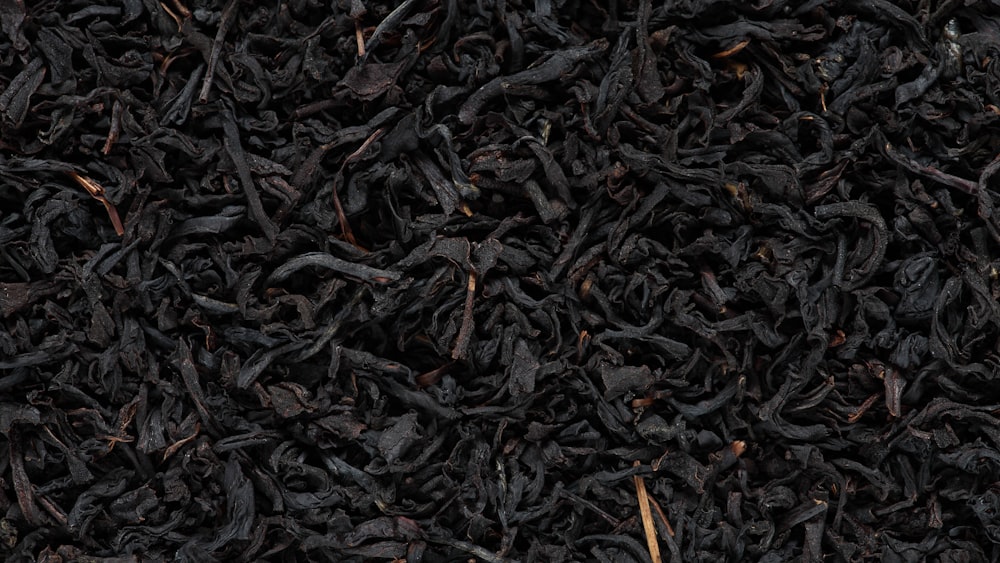
11 Best Teas For Relieving Black Tea Headache Naturally
Have you ever steeped a robust cup of black tea, expecting it to nudge you gently into a state of alertness, only to end up rubbing your temples as a black tea headache taps dance on your skull? If so, you’re not alone. Many tea enthusiasts, seeking the dynamic duo of flavor and perk, sometimes find themselves in this jarring predicament. But fret not! This article is like your tea-infused ‘knight in shining armor,’ ready to rescue you from the clutches of tea-induced woes.
Key Points:
- Black tea headaches can be caused by caffeine and tannins.
- Herbal teas like peppermint, ginger, and chamomile can help alleviate black tea headaches.
- Hydration is key to avoiding tea headaches.
- Gradually reducing black tea intake can help prevent withdrawal symptoms.
- Herbal teas like lavender and lemon balm can help relieve anxiety and stress-induced headaches.
- Understanding your body’s reaction to caffeine and tracking your tea intake can help manage tea-related headaches.
Believe it or not, headaches from tea are a real thing. And no, it’s not because your beloved beverage bears a grudge against you. It’s mostly due to certain elements lurking within those innocuous-looking leaves. Black tea, captivating as it is, might sometimes pack just a tad more punch than your head is willing to tolerate. But, before you start giving your teapot the side-eye, let me tell you about the silver lining – natural remedies galore!
In the enchanting world of teas, there exist several varieties that can help alleviate your headache without resorting to medications or giving up on teas altogether. We’re about to embark on a culinary tour of teas with healing properties that sound almost too good to be true. So, grab your favorite mug, and let’s dive into a treasure trove of information that might just make black tea headaches a thing of the past.
Understanding Black Tea Headaches
Navigating the world of black tea and its connection to headaches can feel like trying to solve a mystery with a particularly elusive culprit. Is it just a simple love affair gone wrong, or is there a deeper, more complex chemistry at play? Whether you’re a casual sipper or a dedicated tea aficionado, understanding the underlying causes can be the key to enjoying your favorite brew without the unwelcome side effects.
What Causes Headaches from Black Tea?
The mystery of black tea headaches begins with the leaves themselves. Yes, those seemingly harmless leaves, drying in the sun, harboring secrets like little green CIA agents. It turns out, the headaches some people experience after indulging in black tea might be the result of overindulgence or, paradoxically, an abrupt reduction in tea intake. The main suspects in this scenario? Caffeine and tannins – both frequent flyers in the world of black tea.
Caffeine, that beloved stimulant, can be a double-edged sword. It gives us that much-needed boost, but in larger doses, it narrows the blood vessels surrounding the brain, leading to headaches. Meanwhile, tannins, known for their bitter taste, not only influence the tea’s flavor profile but can also increase stomach acidity, thus contributing to headaches in a roundabout way. It’s a bit like finding out that the superhero you’ve been rooting for has been playing for both teams.
Understanding the balance of caffeine and tannins in black tea intake is crucial to avoid triggering headaches and maintaining a pleasant tea experience.
The Role of Caffeine in Black Tea Headaches
Digging a little deeper into the black tea headache conundrum, we discover that caffeine plays a leading role, strutting around like it owns the place. But there’s a twist – our bodies can develop a caffeine dependency over time. This means that regular consumption of high-caffeine beverages like black tea (or its notorious cousin, coffee) can make us more prone to headaches when we miss our usual dose. Caffeine withdrawal symptoms can be a real pain, quite literally, prompting a throbbing in your head as if a tiny drummer decided to set up camp there.
But it’s not all doom and gloom. Caffeine also has its virtues, showing pain-relieving properties when consumed in moderation. Studies have shown that it can enhance the effectiveness of traditional pain relief medications. However, balancing is key; too little, and you’re missing out on its benefits; too much, and you risk constricting those blood vessels around your brain a tad too much. It’s like caffeine is playing a game of tug-of-war, and your head is the rope.
11 Best Teas for Relieving Black Tea Headache Naturally
Transitioning from the caffeinated realms of black and oolong teas, we embark on a journey into the world of herbal teas – the unsung heroes in the tale of natural headache relief. These teas, each with its unique profile and remedy, offer a cornucopia of benefits that can help soothe the throbbing pain and bring about a sense of relief without the caffeine-induced roller coaster.

1. Peppermint Tea: A Natural Pain Reliever
Diving into our list, we first encounter peppermint tea, a cooling elixir that feels like a soft breeze on a hot summer day. This tea, with its refreshing aroma and taste, does more than just please the senses; it carries analgesic properties that can relieve headaches and migraines. Picture it as your brain’s cooling pad, dialing down the heat and discomfort in a deliciously minty way.
Additionally, peppermint tea can improve blood circulation, ensuring that your brain receives a steady flow of oxygen and nutrients. It brings relief not just by easing the headache but also by lifting your spirits, as its refreshing scent has been known to act as a mood enhancer. It’s like a swift, minty shadow that chases away the pains and leaves refreshment in its wake.
2. Ginger Tea: Soothes Nausea and Digestive Discomfort
Next on our tour is ginger tea, a spicy titan in the realm of natural remedies. Ginger, with its potent anti-inflammatory and antioxidant properties, can effectively alleviate nausea and digestive discomfort, which are often the unsolicited companions of headaches. Imagine it as your digestive system’s fierce guardian, warding off troubles with its warm, spicy embrace.
This tea also has a unique ability to ease pain and reduce inflammation, thanks to gingerol, the main bioactive compound in ginger. It’s akin to having a miniature warrior within each sip fighting off the aches and pains. Whether it’s a headache or an upset stomach, ginger tea has got your back, offering relief with every steamy cup.
Ginger tea serves as a powerful natural remedy, offering relief from nausea, digestive discomfort, pain, and inflammation with its anti-inflammatory and antioxidant properties.
3. Chamomile Tea: Reduces Stress and Promotes Sleep
Now, let’s take a moment to appreciate chamomile tea, the gentle lullaby in a cup. Known for its calming effects, chamomile tea can be a boon for those suffering from stress-induced headaches. It acts like a soft blanket wrapping around your nervous system, easing you into a state of relaxation and promoting better sleep.
Chamomile’s magic doesn’t end with stress relief. It’s also praised for its anti-inflammatory abilities, helping to soothe your headache by reducing inflammation in the body. Picture it as a peaceful warrior, combating stress and pain with grace and serenity. With its delicate flavor and fragrant aroma, chamomile tea is the perfect nightcap for anyone looking to escape the clutches of a headache and drift off into dreamland.
4. Lavender Tea: Alleviates Anxiety and Tension Headaches
Steeping into the realm of lavender tea, we encounter a fragrant powerhouse known for its ability to alleviate anxiety and tension headaches. Imagine each sip as a gentle embrace, calming your mind and soothing those nagging pains. Lavender tea, with its floral notes and soothing scent, can help reduce blood pressure and lower stress levels, creating an oasis of calm in your busy day.
Moreover, it’s antispasmodic properties make it an effective ally against muscle spasms and tension that may contribute to headaches. Think of it as nature’s spa treatment, enveloping you in a lavender-scented cloud of relaxation. Whether you’re winding down after a long day or seeking solace from stress, lavender tea is your ticket to a more peaceful existence.
Lavender tea is a powerful ally in reducing stress and tension headaches, offering a calming oasis and natural relief for a more peaceful life.
5. Green Tea: Lowers Caffeine for Gentle Relief
Ah, green tea, the old friend with a gentle touch. For those who can’t give up their caffeine fix but want to minimize the risk of headaches, green tea offers a perfect compromise. Lower in caffeine compared to black tea, it provides a subtle energy boost without the rollercoaster effect. Green tea, with its array of antioxidants, doesn’t just stop at nudging your alertness; it also supports your overall health.
Its catechins, a type of polyphenol, are knights in antioxidant armor, fighting off cell damage and reducing inflammation. Plus, the gentle lift of caffeine in green tea is enough to aid in pain relief without pushing you over the edge. It’s like green tea knows exactly what you need, serving it up with a wholesome dose of goodness.
6. White Tea: The Lightest Tea for Sensitive Systems
For those with a sensitive system, white tea emerges as a gentle guardian. Among the lightest of teas, it’s akin to a whisper in a world of shouts, offering the subtlety some of us need. With the lowest caffeine content among the camellia sinensis descendants, it’s like a kinder, gentler caffeine that doesn’t want to overstay its welcome.
But don’t let its delicacy fool you; white tea is packed with antioxidants that help fight inflammation and protect your cells. It’s a quiet champion for your health, promoting a caring, nurturing approach to well-being. Whether you’re seeking a softer touch or want to enjoy the nuanced flavors of tea without the caffeine kick, white tea is a lovely choice that won’t let you down.
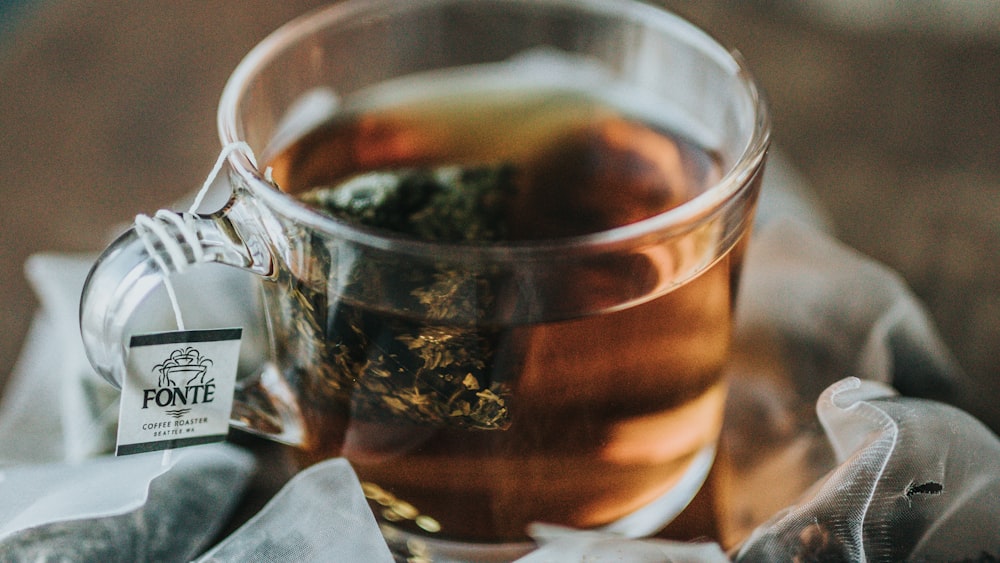
7. Rooibos Tea: Caffeine-Free Antioxidant Powerhouse
Rooibos tea stands out in the crowd for its complete absence of caffeine, making it a safe haven for those looking to dodge caffeine-induced headaches. Rich in antioxidants, rooibos can be your closest ally in the fight against inflammation and free radicals.
It’s like your body’s personal superhero, donned in red from head to toe, ready to fight off the bad guys with its potent polyphenolic content. People savoring rooibos tea can enjoy the deep, earthy sweetness free from the worry of unwanted aftereffects, making it an excellent night-time beverage for anyone seeking restful sleep.
8. Feverfew Tea: A Traditional Remedy for Migraines
Feverfew, an herb with a long history of use against migraines, lends itself to an effective tea that’s more than just a folk remedy. Its active compounds, particularly parthenolide, have been studied for their ability to reduce inflammation and prevent the constriction of blood vessels in the brain. [2]
Think of feverfew tea as your vintage battle axe against migraines, a tool that’s both old-school and impressively effective. With ongoing research highlighting its benefits, this herb turns a simple cup of tea into a strategic defense against migraine attacks, offering a glimmer of hope to those who prefer natural options over medications.
Feverfew tea is a powerful natural remedy against migraines, with active compounds studied for their anti-inflammatory and blood vessel-dilating effects, offering hope to those seeking alternative treatments.
9. Willow Bark Tea: Nature’s Aspirin for Pain Relief
For those of you who feel like you’ve been roundhouse-kicked in the head after overindulging in black tea, let’s talk about willow bark tea. Yes, the same stuff that your garden-obsessed neighbor raves about can be a boon for your throbbing noggin. Willow bark, often hailed as nature’s aspirin, has been chewing the scenery in the world of natural remedies for ages, thanks to its salicin content, which your body converts into pain-alleviating salicylic acid.
Now, before you start stripping your neighbor’s willow tree, let’s brew a cup of this barky elixir. Clinical studies, such as those published in the Journal of Rheumatology, highlight willow bark’s effectiveness in quelling inflammation and pain, making it a valuable ally in your battle against black tea headaches. So, next time your head is throbbing, think of that willow tree, but maybe just brew a tea instead of becoming an amateur lumberjack.
10. Turmeric Tea: Anti-inflammatory Benefits for Headache Relief
Moving on from tree bark to the color of sunshine, let’s talk about turmeric tea. This golden-hued delight does more than just brighten your Instagram feed; it’s packed with curcumin, a compound that’s basically the superhero of the spice world, fighting off inflammation and pain with the voracity of a cat defending its territory. Turmeric tea stands as a testament to the adage that not all heroes wear capes – some just subtly mix with hot water and a dash of pepper for increased absorption. [3]
What’s truly mesmerizing is how turmeric tea not only battles headaches but also fortifies your overall well-being, turning you into an impenetrable fortress against various maladies. So, while you might initially reach for turmeric tea to wave goodbye to your black tea-induced headache, you’ll likely stick around for the myriads of other health benefits.
11. Lemon Balm Tea: Calms the Mind and Eases Headache
Last, but definitely not the least, lemon balm tea enters the fray, waving its flag of peace and calm. This luscious, citrus-scented herb acts like a gentle lullaby for your racing thoughts, ushering in a state of serenity that your headache-weary brain so desperately craves. It’s like slipping into a warm, soothing bath after a day of battling dragons – or you know, the modern-day equivalent: enduring an endless barrage of emails.
Research, like that found in the Frontiers in Pharmacology, illustrates lemon balm’s efficacy in easing stress, improving sleep, and yes, mitigating headache symptoms. So, when your head is pounding with the ferocity of a thousand drums, consider a cup of lemon balm tea your ticket to tranquility – or at least a more bearable evening. [4]
Lemon balm tea offers a peaceful respite for a racing mind, promoting serenity, stress relief, improved sleep, and headache alleviation.
Additional Tips for Managing Tea-Related Headaches
Beyond exploring the haven of herbal teas for headache relief, there are a few more tricks up the sleeve that can help you navigate the stormy seas of tea-related headaches.
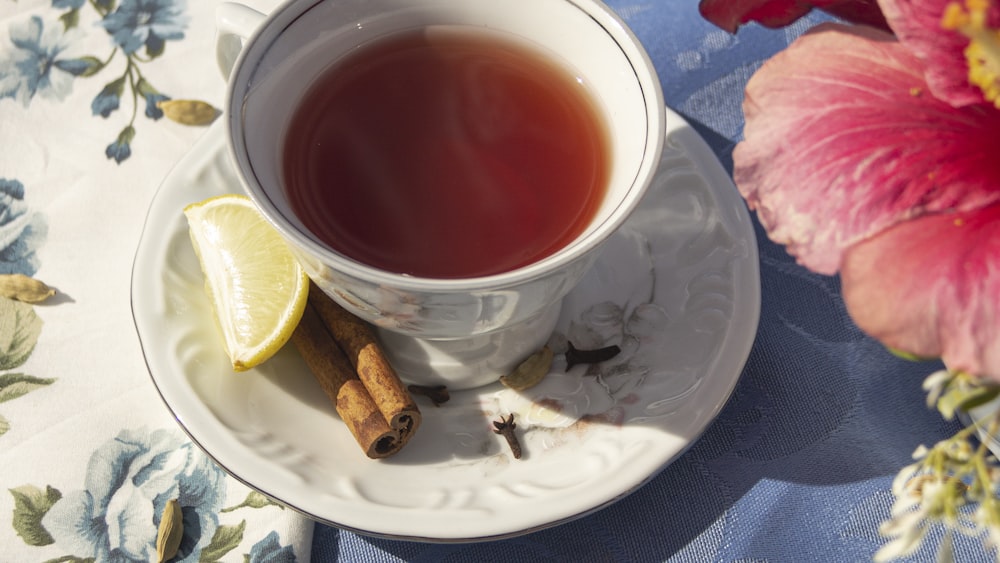
Recognizing Your Tea Tolerance
Understanding your body’s reaction to caffeine is akin to learning a new language – confusing at first, but invaluable once you get the hang of it. Tea, much like any other beverage with caffeine, can be both a friend and a foe, depending on how much you invite into your day. Start by observing how different amounts affect you. It’s about hitting that sweet spot where your enjoyment of tea doesn’t lead you down the path of pounding headaches.
Consider keeping a tea diary – yes, it sounds extra, but tracking your intake and any subsequent side effects (or lack thereof) can be enlightening. It’s not just about the quantity; the type of tea plays a significant role too. Maybe you can waltz through a pot of green tea but a single mug of black tea sends your head spinning. Knowledge, dear tea aficionado, is your first line of defense. [1]
Hydration: The Key to Avoiding Tea Headaches
Ah, hydration, that age-old elixir of life – it turns out it’s also a mighty shield against tea headaches. Who would’ve thought that something as simple as water could be so powerful? Dehydration, often a sidekick of too much caffeine, practically rolls out the red carpet for headaches, inviting them in with open arms.
So, here’s the strategy: For every cup of tea, drink an equal amount of water. It’s like balancing the scales; for every step you take in the caffeinated wonderland of tea, take another back in the refreshing pool of hydration. Your brain – and by extension, your headache – will thank you. And hey, it’s an excellent excuse to flaunt that cute water bottle you just bought.
FAQs
1. Can drinking too much black tea cause headaches?
Yes, drinking too much black tea can cause headaches for some individuals, primarily due to its caffeine content.
2. How can I switch from black tea without withdrawal symptoms?
To switch from black tea without withdrawal symptoms, gradually reduce your intake while incorporating lower-caffeine teas.
3. Are herbal teas effective for all types of headaches?
Herbal teas can be effective for many types of headaches, but efficacy may vary among individuals and different headache causes.
4. How quickly can I expect relief after drinking these teas?
Relief after drinking these teas can be experienced as quickly as 30 minutes, but results may vary based on individual factors.
Conclusion
Finding the perfect remedy for a black tea headache can be a bit of a tea puzzle – a delightful yet sometimes frustrating challenge for those of us who love our brews a bit too much. The good news? With a treasure trove of herbal teas at our disposal and a few handy tips for managing our tea intake, we’re well-equipped to turn the tide against these pesky headaches. Remember, the key lies in balance, understanding your body, and knowing when to switch up your tea varieties or dial back on the caffeine.
As we wrap up this journey through the world of teas, it’s my sincerest hope that you’ve found a beacon of relief in these natural remedies, perhaps even a new favorite tea to treasure. May your cups always be comforting, and your minds clear of the fog of headaches. Here’s to enjoying our beloved beverages without the shadow of discomfort, and to the days of headache-free sipping ahead.
As always, listen to your body, enjoy your tea journey, and keep those headaches at bay. Until next time, take care and sip joyfully.
Warmly,
Zoe

